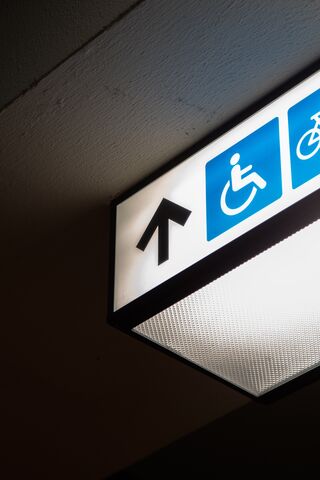Addiction
The Disability Model of Addiction
Is addiction a disability? If it is, it demands reasonable accommodation.
Posted August 3, 2021 Reviewed by Devon Frye
Key points
- Addiction is best understood as a disability, like blindness or deafness.
- The priority of addiction policy should be making reasonable accommodations for addicted people.
- The disability model rejects the idea that addiction is simply a medical problem to be addressed primarily within the medical system.
What is addiction? It is enduringly difficult to say. Our methods of treating addiction have become, over time, both more compassionate and more effective. Yet the nature of addiction itself remains opaque to us.
Is addiction a disease? The question remains controversial, decades after it was first raised. Is addiction a disorder? Or is it a kind of dysfunction? There is no consensus on these questions, or even on whether they are the right questions to be asking in the first place.

I think we need a new approach to these fundamental issues in the philosophy of addiction. In a recent article, I argue that addiction is best understood as a disability. Just as blindness and deafness are conditions that should be provided with reasonable accommodations in a just society, so should addiction be seen primarily as a condition that demands reasonable accommodation.
Addiction as a Disability
To understand this view, it is helpful to reflect on what exactly disability involves. Consider blindness. The perceptual system of a blind person is atypical, relative to that of a person who is not blind. Society in turn is structured in a way that privileges people with a typical perceptual system (that is, people who are not blind), and disfavors those whose perceptual system is atypical (that is, people who are blind). A just and self-aware society recognizes these forms of disadvantage and does what it can to alleviate them by making accommodations—for instance, including braille on posted signs.
Addiction, I argue, is like this too. People who are prone to addiction appear to be in a certain way atypical, relative to people who are not addicted or prone to addiction. Ongoing research in the psychology and neuroscience of addiction is making strides in understanding the nature of that difference. But the crucial point is that people prone to addiction are in a certain way different. Not worse or in any way inferior. And not, for that matter, better or superior either. Simply different.
The difference involved in addiction is one that, like blindness, is systematically discriminated against, often in unnoticed ways. Society is systematically arranged in ways that favor people who are not addicted over people who are: these structural forms of discrimination range from sentencing guidelines for substance possession to state support of lottery tickets. A just and self-aware society recognizes these disadvantages and does what it can to alleviate them by making accommodations—for instance, safe injection sites for people who use intravenously injected drugs.
This, then, is the disability model of addiction. It consists of two claims. First, that addiction is a disability. Second, that the primary focus of addiction policy should be providing addicted persons with reasonable accommodations.
The disability model is not novel. In fact, something like the disability model is already black-letter law in the United States, where drug and alcohol addiction are recognized as disabilities under the Americans With Disabilities Act. Yet, despite its influence in the law, the disability model is curiously absent from discussions in medicine, psychology, and philosophy. Why?
From Disease to Disability
One reason is the lasting legacy of the disease model. The view that addiction is a disease remains dominant, if controversial. The disability model does not necessarily reject this view. Perhaps the difference involved in addiction is, in some sense of that term, a disease.
But the disease model is more than the bare claim that addiction is a disease. It is also a systematic view of addiction on which addiction is in the first place a medical problem, and the addicted person is in the first place a patient. This model has been responsible for major advances in the way that society treats addicted people. But this perspective is also limited, and it is time for us to move beyond it.
This perspective is limited because it encourages seeing addicted people as patients and viewing addiction—at both the individual clinical level and at the level of public health—as a condition to be treated, alleviated, or, most ambitiously, cured. But addicted people are not in the first place patients requiring treatment. They are in the first place fellow citizens who are legally and morally entitled to reasonable accommodations.
The comparison with other disabilities is again instructive. In the case of disabilities like blindness and deafness, we have come to understand that the medical perspective does not always do justice to the lived experience of people with disabilities. We have also come to understand that certain treatments—such as cochlear implants for deaf people—are ones that some disabled people may reasonably choose to reject.
I think we are now in a position to take a similar step in our understanding of addiction. Addiction is a condition that often benefits from medical treatment, but it is not simply or ultimately a medical problem. Rather, addiction is a disability, and many of the interventions that have benefited addicted people—safe injection sites, medication-assisted treatment, the "rehabilitation" system itself—should be viewed as reasonable accommodations of a disability, rather than medical treatments of a disease.
The disease model helped us go beyond seeing addicted people as criminals or morally defective. The disability model, in turn, helps us go beyond seeing addicted people as patients. Rather, we should see them as fellow citizens who require certain accommodations to go about their lives and achieve their goals in a society that has long discriminated against them.
References
Maier, J. (2021). Addiction Is a Disability, and It Matters. Neuroethics.




